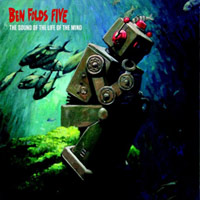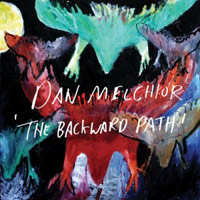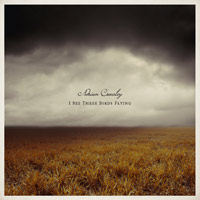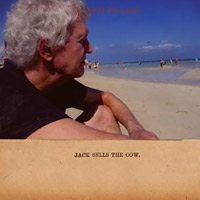
Strapped
Mexican Summer
With a self-titled debut of brash garage rock festooned with hooks, The Soft Pack could have just as easily created a facsimile for album number two and no one would have blinked an eye. Fortunately, as great as that record was for what it is, the band took on the task of the “difficult second album” head on, obviously challenging themselves to push the defining qualities of the band to a new realm. They’ve come out on the other side with Strapped, a record that is as superb as its predecessor and just as different as it is similar to it.
It is similar in that the California band packs each song densely with both musical and lyrical hooks, making it impossible not to have something permanently latch itself to your memory. But for this album, The Soft Pack is working with a new vernacular, adding a heavy dose of synths and sax to their formula. On “Tallboy,” Matt Lamkin talks about striving for some sobriety, singing repeatedly, “I’ve got to dry out to save the life in me, but I fear I need a T-A-L-L-B-O-Y,” over a whirring keyboard line. Similarly, “Bobby Brown” relies more on synth nodes than guitar riffs. But where the band really shines is on songs like “Head on Ice” and “Captain Ace,” where they create a brooding atmosphere vaguely reminiscent of Love & Rockets. On the latter, the album’s closer, all the elements with which they are working—sax, synth and guitars—coalesce into a climax of sound and space. It’s a fitting end to an album that’s as wild as it is wooly. As Johnny Slash would say, Strapped is a totally different head, totally, than The Soft Pack, but thankfully it’s just as whipsmart.
Stephen Slaybaugh

The Sound of the Life of the Mind
ImaVeePee/Sony
The Sound of the Life of the Mind features many of the hallmarks of a Ben Folds Five album: songs with names in the titles (“Being Frank”); surprisingly rocking piano and bass solos (“Michael Praytor, Five Years Later”); lilting melodies set to lyrics about ordinary losers (“Sky High”); and a plaintive album closer (“Thank You for Breaking My Heart”). Unfortunately, it also features a lot of the hallmarks of Ben Folds’ most recent solo works: kitschy vocal tones (“Erase Me”); a “mature” soft-rock sound; and the visible strain of trying to prove that he could care less (the “draw dicks on a wall” chorus of “Draw a Crowd”). I wish I’d been a fly on the wall for these sessions. I’m wondering, mostly, about whether the inspired parts of the record came at the beginning of the process or the end. Did Ben write most of this material before getting the band in the studio? How much input were bassist Robert Sledge and drummer Darren Jesse even allowed to have? Is there better stuff all ready for the next record or is this to be the band’s limp swan song?
Say what you will about Ben Folds Five being a bunch of dorks making dorky music for other dorks, the fact is that, especially on their first two records, their lyrics were served al dente and they made an impressive amount of noise for a three-piece with no lead guitar. Folds banged the shit out of his piano, but that dense sound was mostly due to Sledge’s fuzzed-out bass and Jesse’s propulsive drumming. It’s no wonder Folds’ solo attempts to rock out never came close to the urgency of “One Angry Dwarf and 200 Solemn Faces” or the lo-fi grandeur of “Philosophy.” But what made the group’s work so different than the majority of Folds’ solo output was a sincerity that’s largely missing from The Sound of the Life of the Mind.
The band is at their best on the title track, which is one of about one and a half tracks on which the whole trio sounds fully engaged. They go for a similar feel on “Michael Praytor, Five Years Later,” but despite the band displaying some old school chops, the lyrics (“Michael Praytor, so random...”) and kitschy harmonies (think ELO at their bounciest) betray the layers of confused pretense that have hindered Ben’s songwriting since about 2004. All this comes to a head on “Do It Anyway.” The track initially comes off as a classic ode to individualism and the independent spirit. In fact, it’s a paean to surrendering your free will, doing the wrong thing in full awareness that you’ll regret it, and accepting that sometimes you’re just an idiot. Ben might be very happy with his new “Philosophy,” but to me it seems like the kind of thinking that leads to half-assed reunion albums. Years ago, on “Battle of Who Could Care Less,” Ben lambasted people who pretend to be bored, apathetic, and aloof. What’s easy to overlook is the last line of that song, “You’re my hero, I confess.” So, maybe this is what he was after all along.
Matt Slaybaugh

The Backward Path
Northern Spy
With so much conjecture about how many billions of records Dan Melchior has released in the past few years, I will set the record straight: it still doesn’t matter. What matters is that people are paying attention, and each record gets more interesting as he goes. I sincerely think that he doesn’t care if you track the quantity over the quality. Fans certainly don’t know exactly what to expect from a new record, but after albums like Exerpts (and Half Speeds) and Assemblage Blues, one can hope for something familiar to translate.
On The Backward Path, Melchior spends more time on the acoustic guitar than on previous records where he cranked out familiar electric ax jankalanks and screeches. As such, Dan has seemingly come in from the garage and is now recording in the parlor. Where before his vocals resembled a talking-to from Mark E. Smith, this time around he utilizes a Mayo Thompson–like croon to sing about how retarded your brain has become. Confrontational as ever, the lyrics are still always twisting mindfucks, whether off-the-cuff or parsed and calculated. “Dark Age Tail Spin” has Dan traipsing, minstrel-like, around the burning bush that is Syd Barrett’s influence on modern rock. The background violin wail is supplied by C. Spencer Yeh, and in his fashion, carries Melchior’s nearly traditional guitar ballad about losing your mind. What could, at low volume, seem rudimentary, splits open at full volume to reveal a grotesque lonely beast of a lament. Melchior employs the nebular machinations of coastal electronic poltergeist Anthony Allman again to great effect. Rather than handing over a looming monster of tone and squelch analogous to his work with El Jesus de Magico (the band in which, in the interest of full disclosure, I am also a member), Allman’s contributions are the ominous black shadow following behind Melchior’s luminous lines. Because of the acoustic base of most of these songs, at first listen it sounds like a folk record. But with electronic snippets between the songs in the manner of the interludes on Spiritualized’s Songs in A&E, the contrast with that folk foundation creates a deep clarity and acuity without muddling up the melodies. Now, every time you put this one on, you’ll hear something new, I’m sure. It’s a microcosm of Melchior’s otherworldy ability to consistently put out good work much faster than a majority of listeners can process it. Give it time, folks, and it’ll open up like a grimoire.
Michael P. O’Shaughnessy

I See Three Birds Flying
Chemikal Underground
For more than 13 years, Adrian Crowley has been creating a catalog of songs whose poignancy is only equalled by their own intricately rendered melodies. That the Irish songwriter has largely gone unnoticed on this side of the pond is hard to fathom, especially when the likes of Bon Iver are winning Grammys. Be that as it may, his output has never diminished, with I See Three Birds Flying being album number six.
The record opens with “Alice Among the Pines,” which begins with just piano and guitar, but eventually swells to include strings and woodwinds. With couplets like, “The great shadow maker rises in time. Some things you keep, some you leave behind,” the song is a perfect cross between Leonard Cohen’s lyricism and Bill Callahan’s intonation. Indeed, it’s hard not to hear these unopposed muses throughout the record. Elsewhere, Crowley laments that he “tried to write the saddest song in the world,” and it’s not a far stretch to imagine Cohen or Callahan making the same admission. One could make the case that Crowley has accomplished that goal at least several times, but though there’s a good deal of melancholy in everything he does, it is his artistry that is the greatest allure. I See Three Birds Flying combines beauty and grace to create a kind of musical symmetry that is nothing short of stunning.
Stephen Slaybaugh

Jack Sells the Cow
GBV Inc.
This is a Robert Pollard solo album—12 songs, 32 minutes—hovering around the 80th percentile on a sliding scale of his own design, methinks. With this number, I aim to fold the extent of my critique, as it is all I see fit to impart on a Robert Pollard solo album in 2012, the fourth record he has been a part of this year and the googleth of his career. His net has been cast, with a fanbase like a block of granite and a persistence equally resolute. If ceaselessness panders to futility, here it is the writer’s burden to bear.
But the same agent that puts a damper on criticism’s utility is an accelerant to the torch of a relic. Throughout his oeuvre, Pollard has established a brand of rock infused with weirdness to tone down its biologically high levels of pop. Not only has it endured and inspired, but this brand has resurfaced with a fist at the butt-end of indie rock, the genre as the perfect example of all it ever aspired to be: self-sustaining and true. Don’t be put off by my ad-exec verbiage; Pollard branded before it brought the big bucks. His lyrics cull the strange from the familiar, transpose, and offer it as a placard to something else entirely. He is a petty thief, stealing the uncanny from the rich and giving it back to the poor. Sensing this ain’t too funny right now, Jack Sells a Cow does not suffer from any viral silliness of albums past. There is even a leveled maturity of tongue and tone. Although as a rule “seriousness is a form of infectious stupidity,” I would rather see a jester dressed for court than a king in a clown suit.
Elizabeth Murphy
ALBUM REVIEWS
Sic Alps, Sic Alps
The XX, Coexist
Pet Shop Boys, Elysium
Corin Tucker Band, Kill My Blues
Animal Collective, Centipede Hz
Jens Lekman, I Know What Love Isn't
Neil Halstead, Palindrone Hunches
Gallon Drunk, The Road Gets Darker from Here
Richard Hawley, Standing at the Sky's Edge
Divine Fits, A Thing Called Divine Fits
Dan Deacon, America
Ariel Pink's Haunted Graffiti, Mature Themes
Wild Nothing, Nocturne
Teen, In Limbo
